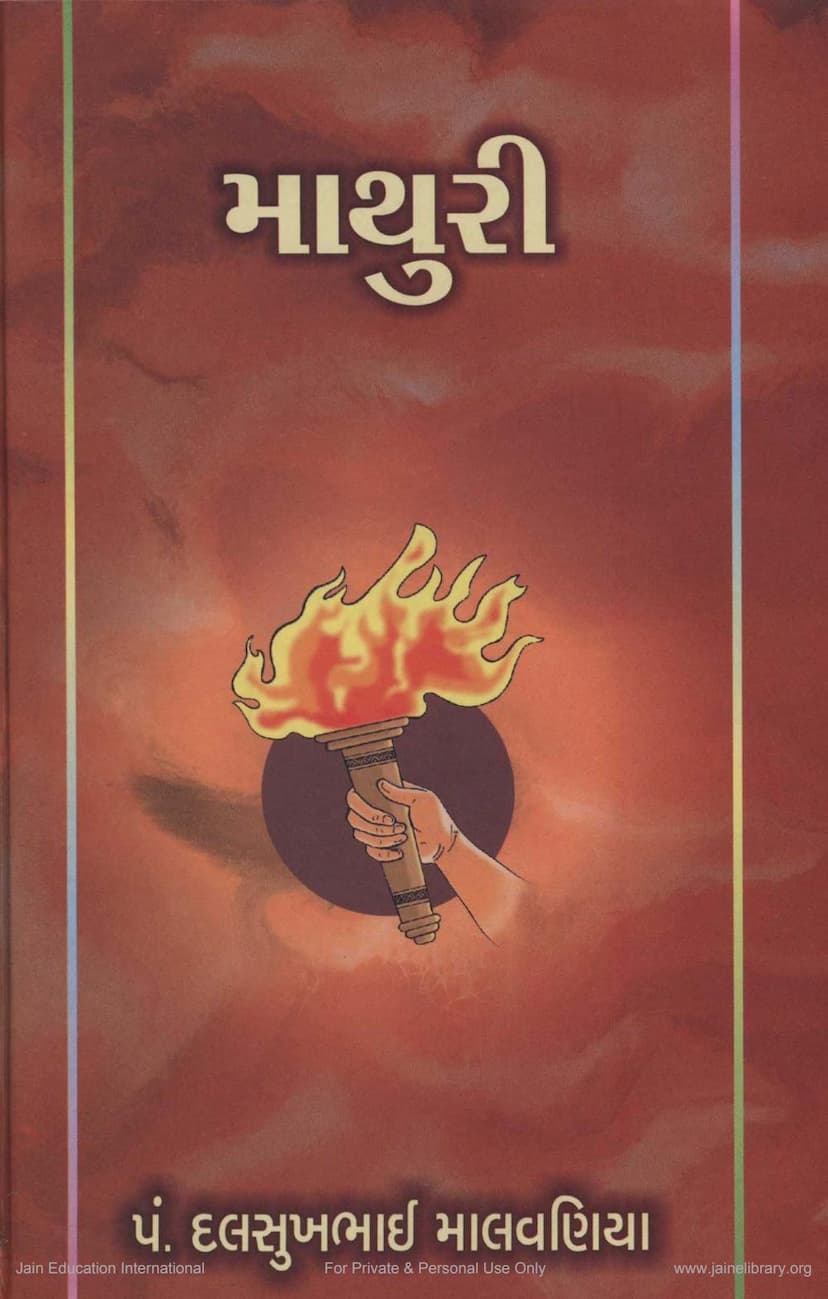Mathuri
Added to library: September 2, 2025

Summary
This is a comprehensive summary of the Jain text "Mathuri" by Dalsukh Malvania, based on the provided pages.
Book Title: Mathuri Author: Pandit Dalsukhbhai Malvaniya Editor: Jitendra B. Shah Publisher: Gurjar Granthratna Karyalay Year of Publication: December 2003 (First Edition) Price: Rs. 150/-
"Mathuri" is a collection of contemplative and original essays by the renowned scholar Pandit Dalsukhbhai Malvaniya. The book, edited by Jitendra B. Shah and published by Gurjar Granthratna Karyalay, aims to bring together selected writings of Pandit Malvaniya that delve into deep philosophical subjects and offer a comparative analysis of Indian philosophical schools.
The book is a tribute to Pandit Dalsukhbhai Malvaniya's lifelong dedication to knowledge and his profound scholarship in Indian philosophy, particularly Jainism. Despite his deep erudition, he was known for his simple lifestyle, unwavering commitment to truth, and willingness to change his views when presented with facts. He strongly advocated for presenting Jain principles accurately and authoritatively on national and international platforms, often countering misrepresentations from other religious or philosophical traditions.
Key Themes and Content of the Essays:
The collection comprises 48 selected essays from Pandit Malvaniya's extensive body of work, which exceeds 300 articles. These essays cover a diverse range of topics, including:
- Lives of Spiritual Leaders: The book includes essays on the lives of Lord Mahavir Swami and Lord Buddha, exploring their teachings and the development of their life stories in religious literature.
- Jain Philosophy and Logic: Several essays are dedicated to understanding the fundamental principles of Jain philosophy, its unique concepts like Anekantavada (non-absolutism), and the intricacies of Jain logic.
- Jain Religious Principles: The book delves into the core tenets of Jainism, emphasizing concepts like Ahimsa (non-violence), Aparigraha (non-possession), and Anekantavada.
- Contemporary Issues: Pandit Malvaniya also addresses contemporary matters, reflecting on how spiritual and philosophical principles can be applied to modern life and challenges.
- Comparative Study of Religions: The essays often draw comparisons between Jainism and other Indian philosophical traditions, highlighting similarities and differences in their approaches to life, ethics, and ultimate goals.
- The Nature of Life, Karma, and Liberation: The collection explores the Jain understanding of the soul, the cycle of birth and death (samsara), the principle of karma, and the path to liberation (moksha).
- Jain Literature and its Evolution: The essays discuss the historical development of Jain literature, the evolution of its language, and the challenges in preserving and interpreting ancient texts like the Agamas.
- The Significance of Tirthas and Rituals: The book examines the meaning and purpose of pilgrimage (tirthas) and ritualistic practices within Jainism, differentiating between external observances and their deeper spiritual significance.
- The Role of Scholars and Institutions: The contribution of scholars and educational institutions in preserving and propagating Jain knowledge is also highlighted.
Pandit Dalsukhbhai Malvaniya's Life and Work:
The book also includes a biographical sketch of Pandit Dalsukhbhai Malvaniya, detailing his humble beginnings, his academic journey, and his illustrious career. Key aspects of his life include:
- Early Life and Education: Born in Sayla, Gujarat, he faced poverty and the early demise of his father. He pursued his education with great determination, even studying at an orphanage.
- Scholarly Pursuits: He received advanced training in Jain scriptures and philosophy under prominent scholars like Pandit Bechardas Doshi and Pandit Sukhlalji. His academic journey also took him to Visva-Bharati, Santiniketan, where he studied Pali and Buddhist scriptures under Vidhushekhar Bhattacharya and Jain Agamas under Muni Jinvijayji.
- Academic and Professional Career: He served as a professor of the Jain Chair at Banaras Hindu University and later as the Director of the Lalbhai Dalpatbhai Institute of Indian Culture, Ahmedabad.
- Contributions to Jain Scholarship: Pandit Malvaniya was a prolific writer and editor, contributing significantly to the field of Jain studies through his original works, translations, and extensive editorial work on classical Jain texts.
- Recognition and Honors: His immense contribution to Oriental studies was recognized with prestigious awards, including the Padma Bhushan by the President of India in 1992.
Overall Significance:
"Mathuri" serves as a valuable resource for anyone interested in Jain philosophy, Indian religions, and the life and thought of one of the 20th century's most influential Jain scholars. The essays offer profound insights into fundamental spiritual and philosophical questions, presented in accessible Gujarati language, making them relevant and inspiring for a wide audience. The book emphasizes the importance of rigorous intellectual inquiry, ethical conduct, and the pursuit of liberation through self-effort, core principles of the Jain tradition.